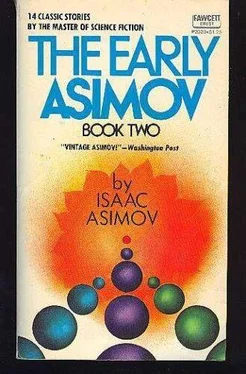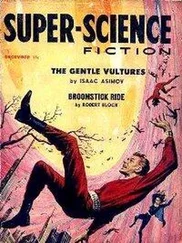Isaac Asimov - The Early Asimov. Volume 2
Здесь есть возможность читать онлайн «Isaac Asimov - The Early Asimov. Volume 2» весь текст электронной книги совершенно бесплатно (целиком полную версию без сокращений). В некоторых случаях можно слушать аудио, скачать через торрент в формате fb2 и присутствует краткое содержание. Год выпуска: 1986, ISBN: 1986, Издательство: Del Rey, Жанр: Фантастика и фэнтези, на английском языке. Описание произведения, (предисловие) а так же отзывы посетителей доступны на портале библиотеки ЛибКат.
- Название:The Early Asimov. Volume 2
- Автор:
- Издательство:Del Rey
- Жанр:
- Год:1986
- ISBN:ISBN: 034-532589-3
- Рейтинг книги:5 / 5. Голосов: 1
-
Избранное:Добавить в избранное
- Отзывы:
-
Ваша оценка:
- 100
- 1
- 2
- 3
- 4
- 5
The Early Asimov. Volume 2: краткое содержание, описание и аннотация
Предлагаем к чтению аннотацию, описание, краткое содержание или предисловие (зависит от того, что написал сам автор книги «The Early Asimov. Volume 2»). Если вы не нашли необходимую информацию о книге — напишите в комментариях, мы постараемся отыскать её.
The Early Asimov. Volume 2 — читать онлайн бесплатно полную книгу (весь текст) целиком
Ниже представлен текст книги, разбитый по страницам. Система сохранения места последней прочитанной страницы, позволяет с удобством читать онлайн бесплатно книгу «The Early Asimov. Volume 2», без необходимости каждый раз заново искать на чём Вы остановились. Поставьте закладку, и сможете в любой момент перейти на страницу, на которой закончили чтение.
Интервал:
Закладка:
Isaac Asimov
The Early Asimov. Volume 2
Introduction
The summer of 1939 was full of doubts and uncertainty for me.
In June I had graduated from Columbia and obtained my bachelor of science degree. So far, so good. However, my second round of attempts to enter medical school had failed, as the first had. To be sure, I hadn't really been anxious to go to medical school and I had tried only halfheartedly, but it still left me at loose ends.
What did I do now? I did not wish to look for some nondescript job, even if these were to be found, so I had to continue with my schooling. I had been majoring in chemistry, so, failing medical school, the natural next step was to go for my degree of doctor of philosophy in that field.
The first question was whether I would be able to swing this financially. (It would have been the first question, even more so, if I had gotten into medical school.) College itself had been touch and go all four years, and my small writing income of about $200 during my senior year had been a considerable help.
Naturally, I would have to continue writing and, just as naturally, my depression made it very difficult to write. I managed one story during that summer; it was called 'Life Before Birth.'
'Live Before Birth' was my first attempt at anything other than science fiction. It was in the allied field of fantasy (as imaginative as science fiction, but without the restriction of requiring scientific plausibility).
The reason for my attempting fantasy was that at the beginning of 1939, Street amp; Smith began the publication of a new magazine, Unknown, of which Campbell was editor.
Unknown caught my fancy at once. It featured stories of what are now called 'adult fantasy,' and the writing seemed to my nineteen-year-old self to be even more advanced and literate than that in Astounding. Of course I wanted desperately to place a story in this new and wonderful magazine.
'Life Before Birth' was an attempt in this direction, but aside from the mere fact that it was a fantasy, I remember nothing more about it. It was submitted to Campbell on July 11 and was back in my hands on the nineteenth. It never placed anywhere and no longer exists.
August was even worse. All Europe rang with the hideous possibility of war, and on September 1, World War II began with the German invasion of Poland. I could do nothing during the crisis but listen to the radio. It was not till September 11 that I could settle down long enough to start another story, 'The Brothers.'
'The Brothers' was science fiction, and all I remember is that it was about two brothers, a good one and an evil one, and a scientific invention that one or the other was constructing. On October 5 I submitted it to Campbell, and on October 11 it was rejected. It, too, never placed and no longer exists.
So the summer had passed fruitlessly and now I had to face another problem. Columbia University was not in the least anxious to take me on as a graduate student. They felt I was going to use the position as a mere way of marking time till I could try once more to get into medical school.
I swore that this was not so, but my position was vulnerable because as a premedical student I had not been required to take a course in physical chemistry and had therefore not done so. Physical chemistry was, however, required for graduate work in chemistry.
I persisted, and finally the admissions board made the following suggestion: I would have to take a full year's selection of graduate courses, and, at the same time, I would have to take physical chemistry and get at least a B in that. If I failed to get the B, I was out on my ear and my tuition money would, of course, not be refunded.
One of the members of the board told me, some years later, that I was offered this in the belief that I would not accept a set of terms so loaded against me. However, since I had never had trouble with passing courses, it never occurred to me that a set of requirements that merely asked that I achieve certain grades, was loaded against me.
I agreed, and when at the end of the first semester there were only three A's in physical chemistry out of a class of sixty, and I was one of them, the probation was lifted.
By December I had gotten deeply enough into my course work to be quite certain I would fulfill all grade requirements.
The only uncertainty remaining was financial. I had to get back to writing.
On December 21 I began 'Homo Sol' and completed it on January 1, 1940, the day before my twentieth birthday. I submitted it on January 4, and on that day, in Campbell 's office, I met Theodore Sturgeon and L. Ron Hubbard, two established members of Campbell 's stable of writers. (Hubbard has since then become world famous, in a fashion, as the originator of the cults of Dianetics and Scientology.)
There is no sign in my diary of any discouragement, but after a year and a half of assiduous efforts, I had failed to sell Campbell more than one story out of the eighteen I had by then written. He had rejected eight stories before buying 'Trends,' and he had rejected seven stories since. (Two stories, which I sold elsewhere, he never saw and had no chance to reject. Had he seen them he would certainly have rejected them.)
One factor in the lack of discouragement was Campbell 's unfailing interest. As long as he didn't get tired reading my stories and advising me about them so kindly, why should I get tired writing them? Then, too, my occasional sales to magazines other than Astounding (there had been six by then) and, especially, the opening up of a new and sympathetic market in the form of Pohl's magazines, helped keep my spirits up.
For 'Homo Sol,' my nineteenth story, there was no outright rejection. Again, Campbell asked for revisions. I had to revise it twice, but it was not to be another 'Black F.riar of the Flame.' The second revision was satisfactory, and on April 17, 1940, I received my second check from Campbell (and, by that time, my seventh check, all told). What's more, it was for seventy-two dollars, the story being 7,200 words long, and was the largest check I had ever received for a story up to that time.
Oddly enough, the clearest thing I remember about that check is an incident that took place that evening in my father's candy store, where I still worked every day and where I was to continue working for two more years. A customer took offense at my neglecting to say 'Thank you' after his purchase - a crime I frequently committed because, very often, I was working without conscious attention but was concentrating deeply on the plot permutations that were sounding hollowly within the cavern of my skull.
The customer decided to scold me for my obvious inattention and apparent lack of industry. 'My son,' he said, 'made fifty dollars through hard work last week. What do you do to earn a living?'
'I write,' I said, 'and I got this for a story today,' and I held up the check for him to see.
It was a very satisfactory moment.
Homo Sol [1]
The seven thousand and fifty-fourth session of the Galactic Congress sat in solemn conclave in the vast semicircular hall on Eon, second planet of Arcturus.
Slowly, the president delegate rose to his feet. His broad Arcturian countenance flushed slightly with excitement as he surveyed the surrounding delegates. His sense of the dramatic caused him to pause a moment or so before making the official announcement - for, after all, the entrance of a new planetary system into the great Galactic family is not a thing likely to happen twice in any one man's lifetime.
Читать дальшеИнтервал:
Закладка:
Похожие книги на «The Early Asimov. Volume 2»
Представляем Вашему вниманию похожие книги на «The Early Asimov. Volume 2» списком для выбора. Мы отобрали схожую по названию и смыслу литературу в надежде предоставить читателям больше вариантов отыскать новые, интересные, ещё непрочитанные произведения.
Обсуждение, отзывы о книге «The Early Asimov. Volume 2» и просто собственные мнения читателей. Оставьте ваши комментарии, напишите, что Вы думаете о произведении, его смысле или главных героях. Укажите что конкретно понравилось, а что нет, и почему Вы так считаете.







